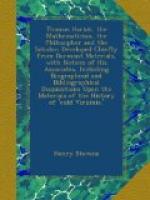mathematician and philosopher. Anthony was indefatigable
in his researches into the biography of Hariot who
was both an Oxford man and an Oxford scholar.
He happily succeeded in mousing out a goodly number
of recondite and particular occurrences of Hariot’s
life. He managed, however, to state very many
of them erroneously ; and he drew hence some important
inferences, the reverse, as it now appears, of historical
truth. This naturally leads one to inquire into
his authorities. Wood’s account of Hariot
appeared in his first edition of 1691, and has not
been improved in the two subsequent editions.
For most of his facts he appears to have been indebted
to Dr John Wallis’s Algebra, first published
in 1685, though ready for the printer in 1676 ; and
for his fictions to poor old gossiping Aubrey; while
his inferences, in respect to Hariot’s deism
and disbelief in the Scriptures, are probably his own,
as we find no sufficient trace of them prior to the
appearance of his Athenæ, unless it be in Chief Justice
Popham’s unjust charge at Winchester in 1603,
when he is said to have twitted Raleigh from the bench
with having been ’ bedeviled ’ by Hariot.
Dr Wallis appears to have obtained part of his facts
from John Collins, who had been in his usual indefatigable
manner looking up Hariot and his papers as early as
1649, and wrote to the doctor of his success several
letters between 1667 and 1673, which maybe seen in
Professor Rigaud’s Correspondence of Scientific
Men of the Seventeenth Century, 2 vols, Oxford, 1841,
8°.
Since 1784, from time to time, several other writers
have partly repeated Wood’s estimate and added
several new facts, as will be shown further on.
But it has been reserved for the Hercules Club, now
just three hundred years after Hariot left the University,
to bring to light new and important contemporary evidence,
sufficient, it is believed, to considerably modify
our general estimate of Hariot’s life and character,
and to raise him from the second rank of mathematicians
to which Montucla coolly relegated him nearly a century
ago to the pre-eminence of being one of the foremost
scholars of his age, not alone of England but of the
world. Had he been walled around by church bigotry
like his friend and contemporary Galileo he would
unquestionably by the originality and brilliancy of
his observations and discoveries have rivalled, or
perhaps have shared that philosopher’s victories
in science. At all events it is believed that
the new matter is sufficient to reopen the courts
of criticism and revision in which some of the decisions
respecting the use of perspective glasses, the invention
of the telescope, the discoveries of the spots on
the sun, the satellites of Jupiter and the horns of
Venus may be reconsidered and perhaps reversed.
It is believed that in logical analysis, in philosophy,
and in many other departments of science few in his
day were his equals, while in pure mathematics none
was his superior.




